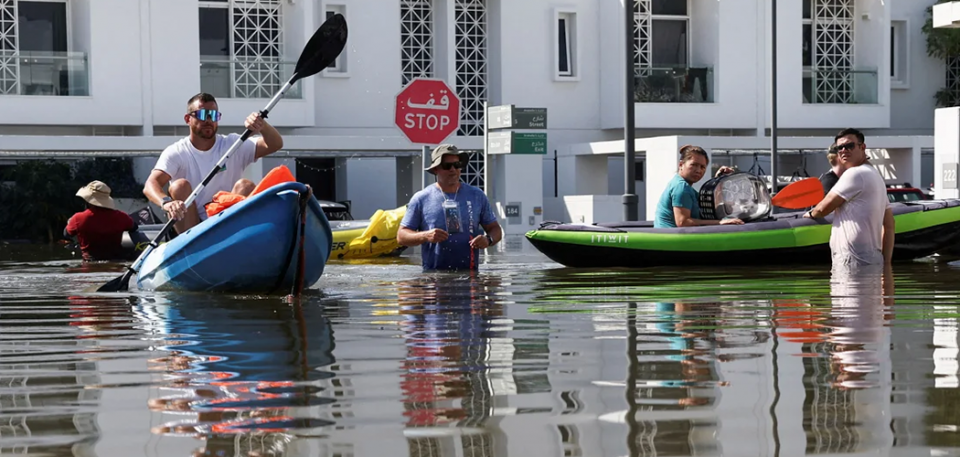
Residents move their belongings on a kayak at a flooded residential complex following heavy rainfall, in Dubai, United Arab Emirates on Thursday. Amr Alfiky/Reuters
By Abbas Al Lawati, Dubai, Apr 22: The scenes from Dubai this week seemed apocalyptic to residents who are more used to the tranquil nature of the sunny metropolis in the desert.
This city hadn’t witnessed a natural disaster of such magnitude since records began, and the destruction it left behind only became apparent after the storm cleared.
The United Arab Emirates, of which Dubai is part, saw the heaviest rainfall in at least 75 years, with more than a year’s worth of precipitation in 24 hours. Life for many in the glitzy tourism and financial hub came to a near halt.
Emergency services worked round the clock, and no deaths in the city were reported, although a 70-year-old man died after flooding swept away his vehicle in neighbouring Ras Al-Khaimah emirate.
The chaos that ensued was short-lived, but it showed the city’s vulnerability to natural disasters.
As runways went underwater, flights were cancelled at one of the world’s busiest airports. Flashy malls were soaked with rain seeping through ceilings, and elevators stopped functioning in skyscrapers, forcing residents to climb stairs up dozens of floors. Unable to return home, some motorists slept in their cars due to blocked roads.
The images were shocking for the hi-tech city, a leading international tourist destination which boasts a world-class infrastructure, some of which gave in to natural disasters. Rain is scarce in the Persian Gulf region and urban planning does not account for the possibility of major storms.
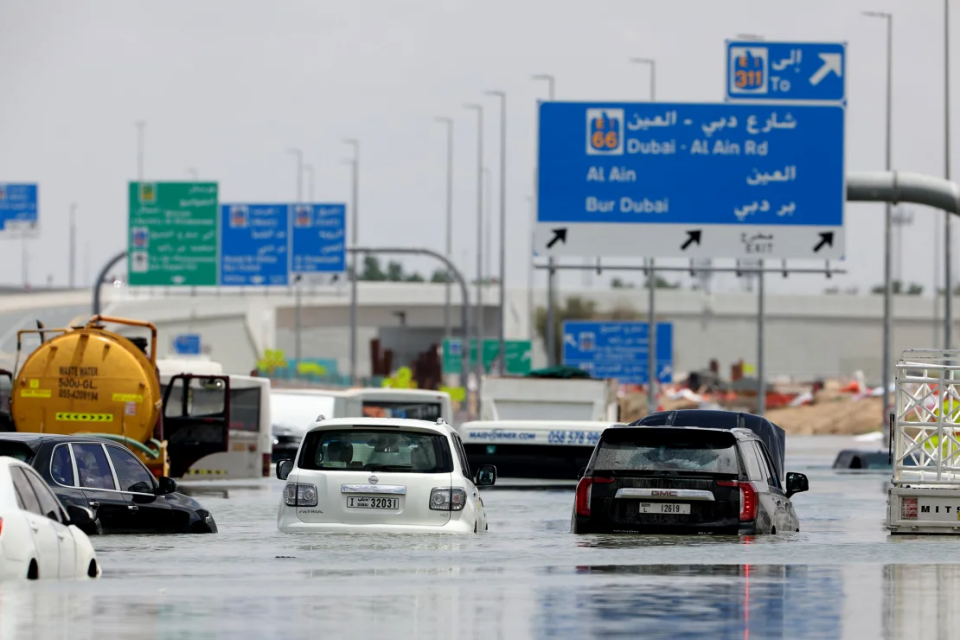
Abandoned vehicles on a flooded highway after a rainstorm in Dubai, United Arab Emirates on Wednesday. Christopher Pike/Bloomberg/Getty Images
Dubai has a unique demographic model. Of its 3.5 million people, 92% are foreigners who come from 200 countries to live and work in the city, lured by its tax-free status and relaxed lifestyle.
It is the world’s second-best tourist destination, according to one report, with more than 17 million visitors arriving last year, drawn by year-round sunshine, gourmet eateries and luxury shopping.
The disruptions this week impacted almost everyone, from tourists and migrant workers to the minority citizen population and Western expatriates.
The authorities called on people to stay home, but many ventured out anyway, only to find themselves unable to return due to waterlogged streets.
“The scary part is that there was nowhere you can go,” said Sofie, an expatriate resident who declined to provide her last name. She ended up stranded by the submerged roads for nearly 12 hours, some of which were spent sleeping in her car.
On Sheikh Zayed Road, a 16-lane thoroughfare in Dubai lined with gleaming glass skyscrapers, motorists reported near-complete blockage in some areas, with cars going against the traffic to escape the gridlock. In the financial district, home to the regional operations of some of the world’s top banks, luxury cars were seen almost entirely underwater as the streets turned into lakes. In the man-made Dubai Marina, a popular destination for Western and Russian visitors, furniture from nearby restaurants and coffee shops was swept away by the current.
Significant damage
When the waters receded, streets were left strewn with debris. Images in local media showed highways with lanes of abandoned cars; in some neighbourhoods, they had yet to be removed by Thursday morning.
The economic damage from the storm could go into billions of dirhams, with a significant impact on vehicles, properties and infrastructure, said Avinash Babur, chief executive of InsuranceMarket.ae, an insurance broker in the UAE (1 dirham is equivalent to $0.27).
“The current damage is significant, with notable effects on both public and private properties, including key infrastructure,” he told CNN. “While Dubai has experienced storms in the past, the unique intensity of this event has posed new challenges.”
The volume of calls and enquiries for insurance companies has jumped tenfold, he said, with a surge in demand for home insurance.
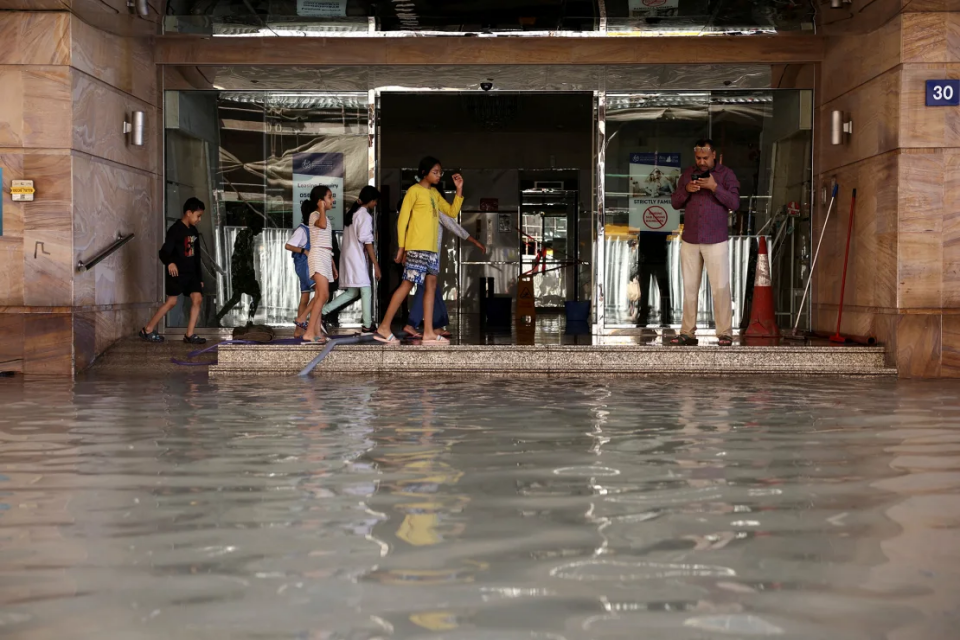
People stand as flood water caused by heavy rains covers the stairs of a residential building, in Dubai, United Arab Emirates on Wednesday. Amr Alfiky/Reuters
As some residents became trapped in their houses without electricity and unable to leave due to flooding outside, some opted to swim through swamps to escape. With landline use becoming increasingly rare, those without electricity relied on power banks to use their smartphones.
For many, the confinement was reminiscent of Covid-19 lockdowns in 2020.
Heavily reliant on foreign visitors and capital, Dubai was one of the first cities to come out of lockdowns as tourist numbers dwindled and property prices fell, and the UAE was among the first countries to achieve 100% vaccination in November 2021.
Babur said the current situation presents an opportunity for Dubai “to showcase its resilience and rapid recovery capabilities, similar to its effective management during the Covid-19 pandemic.”
Reliance on smartphones
With food apps suspending deliveries during and after the storm, some residents had to resort to canned food, or whatever was left in their fridges, for sustenance. Those without electricity used barbeques to cook frozen food left thawing in freezers. Some fared even worse, with homes inundated with water, sometimes up to the waist, according to videos shared in local media, with belongings, furniture and appliances destroyed.
The UAE has one of the highest smartphone penetration rates in the world, at 96% (the United States is at 90%, while China is at 72%). Residents rely heavily on home deliveries for everything from groceries and car fuel to ice cream and pedicures at the tap of a screen, a phenomenon that took off during the COVID-19 lockdowns.
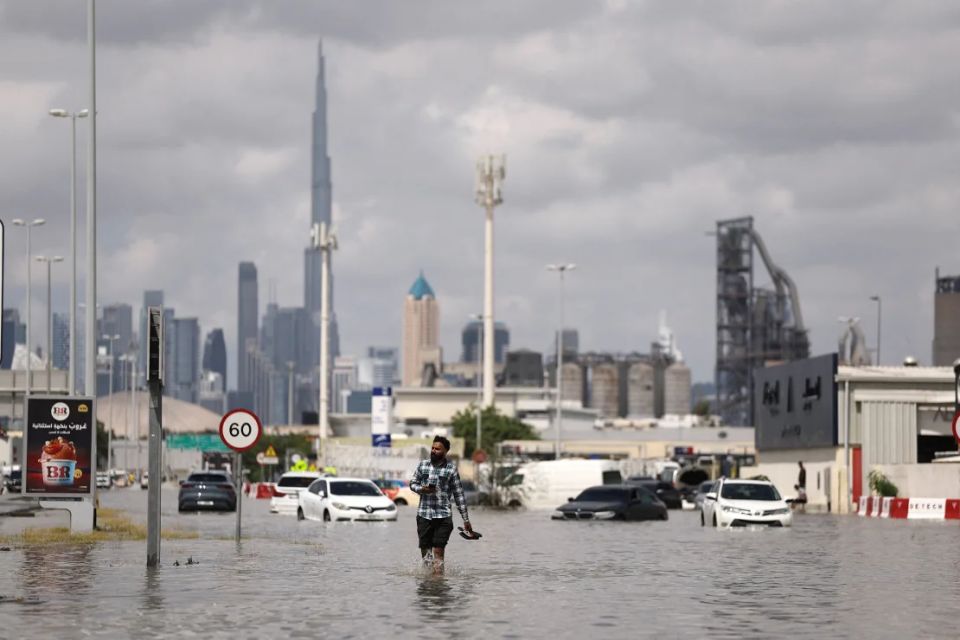
A man walks in flood water caused by heavy rains, with the Burj Khalifa tower visible in the background, in Dubai, United Arab Emirates, April 17, 2024. REUTERS/Amr Alfiky Amr Alfiky/Reuters
On a normal day, the city’s streets are teeming with bikers rushing to make deliveries for companies that promise a 20-minute dispatch for groceries and 40 minutes for food. But early this week, most weren’t delivering. That forced people to venture out on foot, leading to large crowds in neighbourhood eateries and supermarkets, with hours-long lines for food in some cases. Some restaurants stayed open until the early hours to accommodate the demand. Residents reported seeing empty shelves for some items in supermarkets the day after the storm, including frozen food and ready meals. The delivery apps started resuming services by Thursday but were still facing long delays.
Ali Salem, a 55-year-old retired Emirati, told CNN on Thursday that he had been trapped in his house in Dubai’s upscale Jumeirah district since the storm hit on Tuesday due to waterlogging on his street. The home has been without water or electricity since then, he said, and he was told by the utility agency on Tuesday that he’d have to wait two days for the issue to be resolved. Electricity was finally restored on Friday.
“Lesson learned,” he said. “A generator would be useful in the future.”
A festive atmosphere
The rain, however, wasn’t as miserable for the young. Schools moved to distance learning for the rest of the week, but some pupils with no electricity in their homes were delighted to take a holiday, unable to power their computers.
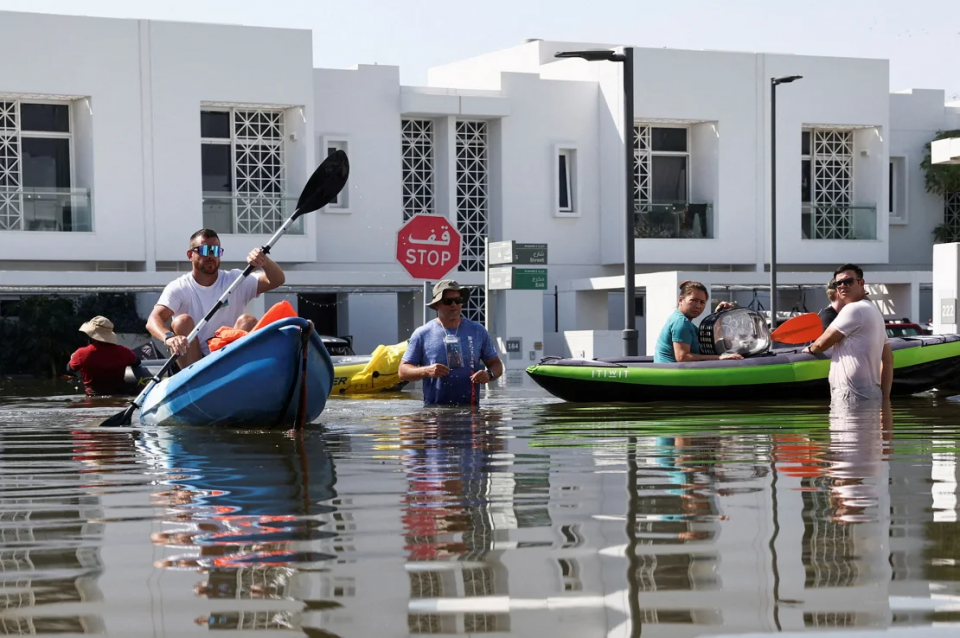
Residents move their belongings on a kayak at a flooded residential complex following heavy rainfall, in Dubai, United Arab Emirates on Thursday. Amr Alfiky/Reuters
Then the memes started, with residents finding joy and humour in the inconvenience of a once-in-75-years phenomenon. One viral social media video showed fish swimming in a pool of water on a pavement next to an overflowing manmade lake. Several videos on social media showed a festive atmosphere, with children hopping on dinghies as their neighbourhoods turned into ponds. One video showed migrant workers playing volleyball in ankle-deep water; in several others, residents could be seen wakeboarding in flooded streets.
Another video showed boys jet skiing at full speed in a residential neighbourhood, with the caption: “Only in Dubai.”










